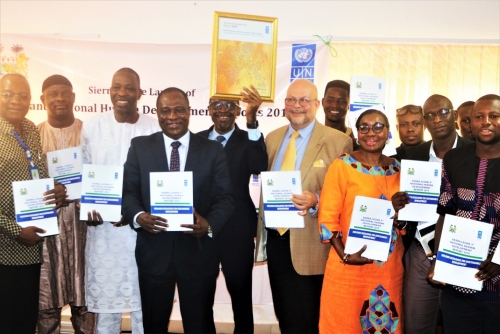By Amin Kef Sesay
During the launch of the 2019 Global Human Development Report (GHDR) alongside the National Human Development Report (NHDR) at the Ministry’s offices on 13th December, 2019 Minister for Planning and Economic Development, Dr Francis Kai Kai said: “We are very determined as a nation to change the landscape and narrative of our poverty and human development estimates within the framework of our current national development plans and the sustainable development goals.”
From when the Human Development Report was first published in 1990, Sierra Leone has made commendable progress in its human development trends more so when considering its recent stormy past. After an 11-year civil war that ended in 2002, the country experienced a slow but gradual economic recovery until 2014-2015 when the Ebola virus health emergency struck followed by the slump in iron ore (Sierra Leone’s leading export commodity) prices.
The effects of these crises have since continued to manifest in the slow economic recovery and growth but overall, Sierra Leone has been and remains resilient in its resolve to sustainably grow and develop better.
“Even in the face of several human tragedies and financial resource constraints, Sierra Leone has demonstrated resilience that defines a pathway to build on the country’s strength and minimizes vulnerabilities,” said UNDP Resident Representative, Dr. Samuel Doe, at the event.
Indeed, Sierra Leone has moved three places up in the Human Development Index (HDI) ranking from 184 in 2018 to 181 out of 189 countries according to this year’s GHDR entitled ‘Beyond Income, Beyond Averages, and Beyond Today’ based on the premise that, inequalities in human development are not just about disparities in income and wealth.
The 2019 Human Development Report (HDR) explores inequalities in human development by going beyond income, beyond averages, and beyond today. The proposed approach sets policies to redress these inequalities within a framework that links the formation of capabilities with the broader context in which markets and governments function.
‘Building Resilience for Sustainable Development’ was the theme of the Sierra Leone 4th National Human Development Report also launched at the same time inspired by the global theme and the country’s development trajectory over the past years and looking forward into a better future.
The report comes in the middle of the preparations for Sierra Leone’s ‘Roadmap to walk out of fragility by 2023’ undertaken by the Ministry of Planning and Economic Development supported by UNDP.
In Sierra Leone, there has been encouraging institutional reforms: many of the appropriate laws, polices, processes and structures for democratic governance and social and economic stability are in place according to the Mo Ibrahim Governance index 2019. Sierra Leone’s trends show commitment to address inequalities.
The human development lens is central to approaching inequality and asking why it matters, how it manifests itself and how best to tackle it. Imbalances in economic power are eventually translated into political dominance. And that, in turn, can lead to greater inequality and environmental disasters. According to the 2019 GHDR, actions at the start of this chain are far easier than relying on interventions farther down the track. The 2019 GHDR contributes to that debate by presenting the facts on inequalities in human development and proposing ideas to act on them over the course of the 21st century.
“We embrace the 2019 Human Development Reports. They indicate that Sierra Leone is making steady progress. They will strengthen our efforts towards achieving better results by providing data and guidance to tackle inequalities that hinder Development” the Statistician General emphasized.
The ‘twin launch’ of the reports, attracted widespread attendance and interest from Government officials from Ministries, Departments and Agencies (MDAs) and traditional stakeholders including the media, civil society groups, donors, UN Agencies, representatives of the diplomatic community and other development partners.




